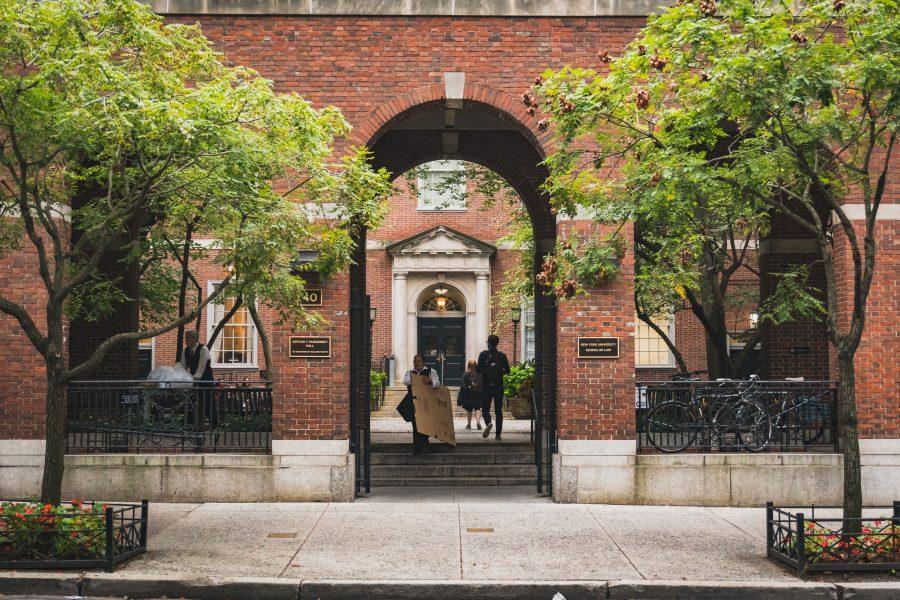Brett Kavanaugh heard his first arguments as an associate justice in the Supreme Court on Tuesday morning. He was confirmed on Saturday with a tight 50-48 Senate vote, following last week’s hearings on sexual assault allegations brought against him by Dr. Christine Blasey Ford.
Observers from all parts of the political spectrum had strong opinions on Kavanaugh’s confirmation — including more than 40 NYU professors. They constituted a handful of more than 2,400 law professors who signed a letter opposing Kavanaugh’s confirmation last week. The letter was presented to the Senate on Thursday, the day of the Judiciary Committee’s hearing with Kavanaugh and Ford.
For professor of clinical law Kim Taylor-Thompson, Kavanaugh’s hearings brought back memories of a case she had been involved with before. She was part of the legal team for Anita Hill, an attorney and law professor who accused Supreme Court Justice Clarence Thomas of sexual harassment in hearings held before the Senate Judiciary Committee in 1991.
“Even though 27 years have passed, it doesn’t seem that the senators learned much,” Taylor-Thompson said. “But they did learn the optics lesson: they learned that it was better to have a woman questioning Dr. Ford rather than having all the white male Republicans doing that. They got the optics, but they missed the substance. They clearly did not understand or were unwilling to confront what it was that she was saying.”
Taylor-Thompson said the FBI investigation concerning Kavanaugh, which was conducted in a matter of days, was a half-baked investigation designed to give the appearance of due process.
“The investigation was really just a rush to get this through,” Taylor-Thompson said. “The FBI was doing what its client had asked it to do, and its client was the White House.”
Another signatory on the letter, Associate Professor of Clinical Law Deborah Archer, said Kavanaugh’s demeanor during the hearings showed him to be unfit for the highest court in the country.
“The United States Supreme Court must be above the extreme partisanship that is controlling the other branches of the federal government,” Archer said in an email to WSN. “During his testimony he was insolent in response to questions from certain Senators. He dismissed the allegations against him as a left-wing conspiracy orchestrated as revenge on behalf of the Clintons. Judges must keep a strict division between their private emotions and personal politics on one hand and their public and judicial acts on the other. These statements, injecting partisan sentiment, raise serious concerns about Judge Kavanaugh’s ability to be fair and balanced.”
Others were likewise disappointed by Kavanaugh’s behavior during the hearing.
“There’s a really high expectation of behavior in the courtroom,” Amanda Sen, an acting assistant professor of lawyering at NYU Law, said. “Judge Kavanaugh knows that perfectly well. And he knows about expectations of professional behavior. He was not in a courtroom, but he was in a very public, very professional setting as a judge, and I think he very deliberately chose to disregard that.”
Richard Epstein, the Laurence A. Tisch Professor of Law and director of NYU Law’s Classical Liberal Institute, also took issue with the way that Kavanaugh’s confirmation process was handled — but for different reasons. Epstein, who did not sign the letter, said one crucial flaw in the hearing was California senior Senator Dianne Feinstein’s decision to keep private a letter she received on July 30 that contained allegations against Kavanaugh.
“Having announcements about a candidate essentially outside the Senate room, where they cannot be refuted, but they can be extremely toxic and so forth, none of that is appropriate,” Epstein said. “It is as far as I’m concerned a most serious breach of Senate rules for anybody to sit on this information without sharing it.”
After an article surfaced that drew attention to Feinstein’s withholding of the letter, the senator relayed the allegations to federal investigators, saying she had been reluctant to do so initially because the woman who disclosed those allegations had requested confidentiality.
Epstein noted that Kavanaugh appeared “contrite” for his outbursts.
“The last thing you want to do is to give a hearing in which there is a character assassination,” Epstein said. “The man is a perfectly honorable judge, perfectly competent.”
As for the sexual assault allegations at the heart of the hearing, Epstein is not convinced they are true.
“Look at evidence, instead of presumptions,” Epstein said. “I don’t think he was guilty, but who knows? I can’t swear to it, I wasn’t there.”
Professors outside of the law school also weighed in on Kavanaugh’s confirmation.
Gallatin Associate Professor of Practice Vasuki Nesiah said Kavanaugh’s track record in previous cases was just as off-putting as his behavior in the hearing.
“I don’t believe the Senate process and media coverage gave due consideration to all the issues raised by his legal writing and his judicial record of undermining civil rights, deregulating [sic] corporations, disempowering migrants, restricting reproductive rights, deference to executive power, resisting restrictions on gun purchases [and] legitimizing incursions on civil liberties in the name of national security,” Nesiah said in an email to WSN.
Looking forward, Nesiah hopes people will put more emphasis on local lawmaking if they are unhappy with the newest Supreme Court justice.
“The oligarchic dimensions of the [U.S.] political system has vested extraordinary power with the decisions of each individual on the Supreme Court,” Nesiah said. “Losing the Kavanaugh nomination fight should be the catalyst to fight that oligarchic structure and develop more creative and democratic strategies for local communities’ self-government on the issues that matter.”
Email Sarah Jackson at [email protected].


























































































































































